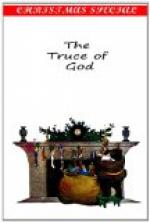part at Zurich. He was connected with Henry of
Austria by a double tie, Matilda, his first wife, having
been the sister of the king, and Adelaide, to whom
he was then married, being the sister of the queen.
But, though thus allied to Henry, he neither loved
nor respected him. Once, indeed, the emperor
had summoned him to court, on the charge of entertaining
projects hostile to the house of Franconia, but Rodolph,
well knowing the treacherous character of the monarch,
and always a hero, boldly refused, preferring the
fortune of arms to the fate of an investigation.
Subsequently, filled with horror at the impiety of
the Saxons in burning the Cathedral at Hartzburg, hallowed
by numerous relics, and filled with the rich offerings
of the faithful, he had united with Henry to chastise
their sacrilege. At the battle of Hohenburg,
in the van—the privilege of Suabia—he
distinguished himself above all others by his impetuous
valor, and only left the field when covered with wounds.
Rodolph was equally remarkable for the size and beauty
of his person, and the elevation of his soul.
The Teutonic antiquities contain many songs of the
Minnesingers, in which he is invested with all the
qualities of mind and heart and body that can adorn
the knight; but one fault is imputed to him—ambition.
His subjects almost worshipped him, and his power
is said to have been built upon their hearts.
So conspicuous was he among his brother dukes, that,
at the Diet of Gerstungen, in 1073, he had been offered
the imperial crown, but he declined it unless awarded
by the unanimous suffrages of the confederation.
Between him and the Baron of Hers a close friendship
of long standing had existed, which had been interrupted
by the baron’s refusal to accompany him the
preceding year in the expedition against Saxony.
This refusal had been dictated by the knight’s
invincible repugnance to Henry, and by the politic
move of conciliating all who opposed the emperor.
Since the battle of Hohenburg they had not met.
After receiving the formal salutation due to his rank,
Rodolph cordially embraced the Lord of Hers, and extended
his regards to Gilbert, who could not sufficiently
admire the hero of Hohenburg.
“But for your father’s obstinacy,”
he said to the youth, “you would now be a knight.
But I will see you win your spurs yet.”
The greetings over, they all began to ascend the hill.
The duke would not pass the chapel without entering.
The pavement upon which they knelt had been worked
with many a rich and curious device; but time and the
knees of the faithful had worn away most of the finest
tracery. At the foot of one of the columns still
remained this fragment of an inscription:
Hoc pavimentum ... feci
... ductus amore Dei.
This was the spot upon which the duke loved to kneel.
Before rising, he drew from under his robe a golden
chalice, and gave it to Herman, who was beside him.
The priest took it and carried it to the sanctuary.




